The Obama administration approved privacy protections last year to stop Internet service providers from selling information about their consumers' browsing history without their consent. Congressional Republicans, ignoring objections from Democrats and privacy advocates, undid the rules last month.And yesterday, Donald Trump put his signature on the measure.
President Donald Trump signed legislation Monday killing privacy rules that would have required internet service providers to get your explicit consent before they share or sell your web browsing history and other sensitive information.The rules were approved in the final months of President Barack Obama's administration but hadn't taken effect yet. Under the bill Trump signed Monday, they never will -- and the FCC isn't allowed to try to pass new rules.
The new GOP policy is not at all popular, and other than the industry's corporate lobbyists, no one seemed to actually want this change. And yet, congressional Republicans and the Trump White House agreed to make this an early 2017 priority.As we discussed last week, none of this is good news for privacy advocates. The Washington Post reported that service providers, including online giants such Verizon and Comcast (MSNBC’s parent company), “will be able to monitor their customers’ behavior online and, without their permission, use their personal and financial information to sell highly targeted ads – making them rivals to Google and Facebook in the $83 billion online advertising market. The providers could also sell their users’ information directly to marketers, financial firms and other companies that mine personal data – all of whom could use the data without consumers’ consent.”Slate's piece added that it’s not just privacy at stake: “Some proponents of the FCC regulation argued that allowing ISPs to keep track of and sell consumers’ data exposes their information to more security threats. The Electronic Frontier Foundation notes that if internet providers want to sell customers’ data, they’ll have to collect it first, which makes for an appealing target for hackers.”If you're looking for pictures of the president signing this measure into law, however, you won't find any -- which is itself a notable departure from Trump's usual m.o.As a rule, Trump, obsessed with "optics" and the appearance of work, likes to put on a show when signing bills or executive orders. This White House takes stagecraft very seriously, and officials don't like to pass up opportunities showing the president "getting things done."That changes, however, when the president is getting unpopular things done.When Trump signed legislation expanding gun access for the mentally impaired, he did so behind closed doors. The same is true when Trump revoked federal guidelines "specifying that transgender students have the right to use public school restrooms that match their gender identity."No cameras, no ceremony, no tweets, no carefully chosen Americans to stand by the president's desk. It's hard not to get the impression that Team Trump knows when the public won't like what the president is up to.
